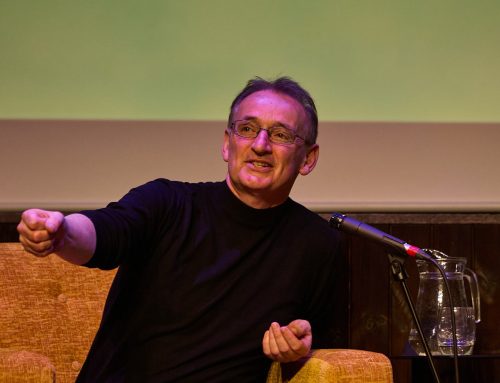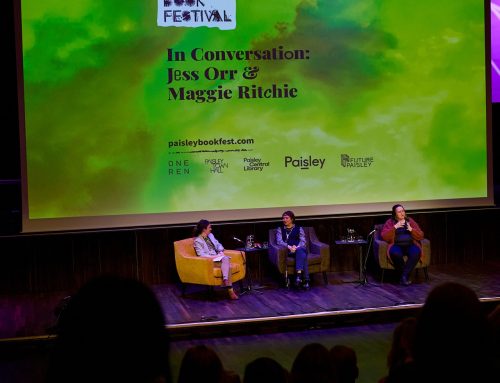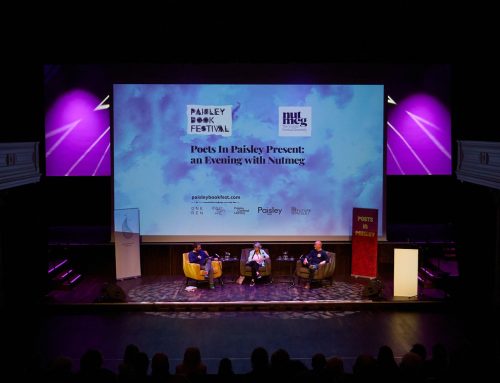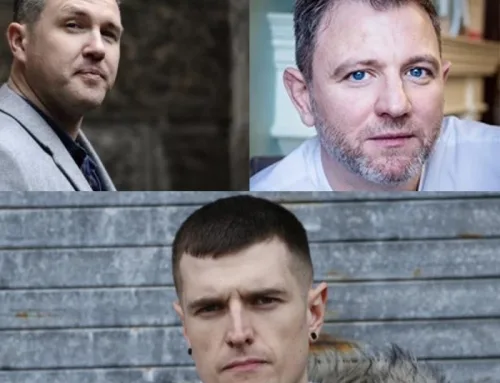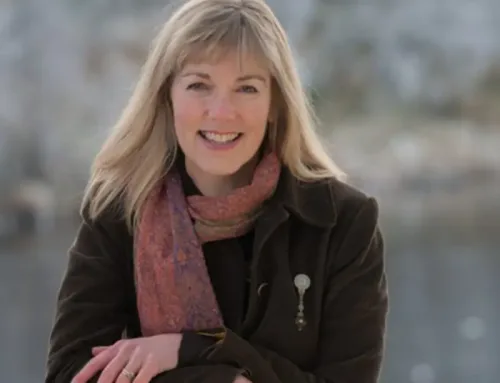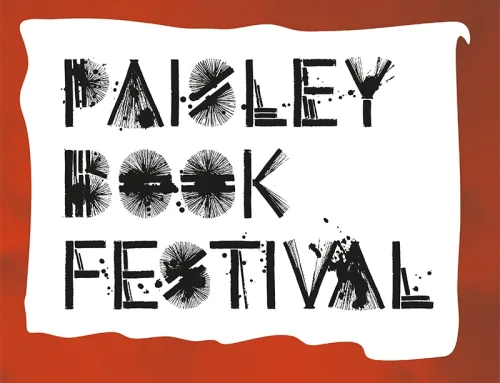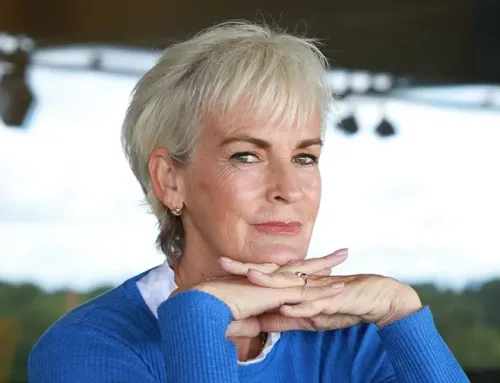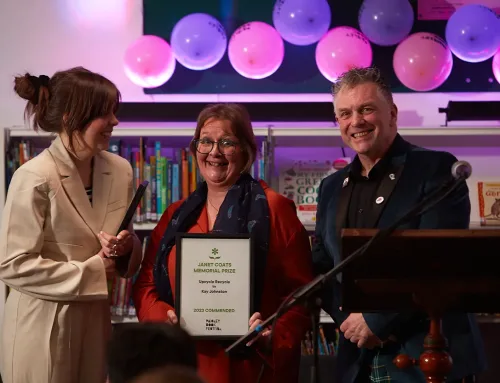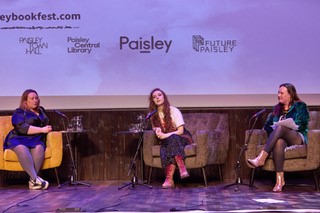
With two ‘firebrand creatives’ Sarah Grant and Len Pennie discussing issues of identity, language, and body image, with Festival producer Louise Oliver, this was always going to be an event where boundaries were pushed, orthodoxies challenged and stereotypes smashed.
Sarah Grant’s new book, Fat Girl Best Friend, is an exposition of the harmful ways that plus size women are portrayed in film and television. Interest in this theme arose from Sarah’s own acting and filmmaking experience. Responding to calls for a plus size actor, she would find that the characters were always cast as dull and stupid, and were never involved in any meaningful way in the development of the plot. Inspired to do more analysis, Sarah set about dissecting films and TV shows, exposing the stereotypes and common tropes surrounding plus-size characters. Beyond the harmful, lazy stereotypes, Sarah’s work highlights the extent to which mainstream narratives have been gaslighting us all our lives. Sarah read a section from her book, and Louise noted the phrase, ‘rage and anger’.
Len Pennie, poet, Scots language advocate and now published author of her new book “Poyums”, stated that sometimes rage is all you have. Anger is useful in a creative sense, but it is also problematic when perceived in women. Women are told to calm down when they’re angry. ‘We are regulated by the tone police,’ she said. When we ask marginalised or traumatised people to leave their anger at the door, we are stripping them of the only voice they sometimes have. ‘If I keep it all in, I’m packaging it for other people. Rage is a tool that I harness in my work. Sometimes it’s the only feeling I have but it still keeps the motor running.’
Sarah agrees. Girls are taught to be nice. She shares her new favourite aphorism with the audience, it’s from Augustine of Hippo, who says hope has two daughters: anger and the desire for change.
Before she read her poem ‘Chattin Shite’ Len told a story about being interviewed by Martin Geissler about her book of poetry. He said to her, I just love ‘Chatting Shite’, and she responded, ‘aye I can tell’, before apologising, ’I don’t know what came over me!’ to the raucous laughter of recognition from the audience.
This leads Louise onto the subject of language and, in particular, vernacular or Scots languages.
Len emphasised the cultural importance of the Scots language and an interesting discussion ensued that weaved class and power dynamics into the very heart of the issue. Len stressed her annoyance at the extent to which non-Scots speaking actors and, in some cases, non-Scots actors are cast in Scottish films and TV, to play Scottish characters.
Noting the perceived pressure to ‘speak properly’, she mentioned that her mother used to say Scots was a jacket that you need to take off in some situations. For Len, however, it was the opposite. Avoiding its use was an effort and an encumbrance. Speaking English was, for Len, ‘a jacket she had to put on’. Critical of the fact that it was something of a class signifier, she used, as an example, the coaching she received in her own domestic abuse case for the purposes of giving evidence. Women who speak in Scots, she was told, are seen as less credible witnesses.
Sarah talked about her role in the creative industries and of how she had to ‘dig the vernacular out’ of her own mouth in order to work in media. Len interjects, “but that’s not your fault, you’ve been forced to do that. You have to adopt a certain way of speaking in order to fit in and be accepted. By doing this, you only end up feeling uneasy in both spaces.” The insights are fizzing between the two. “This is ‘code-switching’”, says Len, “it’s a survival tactic.”
This insightful conversation oscillates around the published work of Len and Sarah, focusing on the requirement in certain cultural fields to conform to dominant ideals. While Sarah’s work is focused on the depictions of bodies such as ‘appropriate’ forms of embodiment and behaviour for women, size and space is discussed as a powerful way of requiring conformity and manufacturing exclusion. Like appearance, language is seen as legitimate only because it has been socially approved by certain groups, the members of which have come to dominate the cultural field. People, as Len points out, are then ‘forced’ to adopt the culturally dominant language or dialect in order to legitimatise themselves and to give legitimacy to what they are saying. This is a universal phenomenon that can only be challenged through the adoption of an alternative. Here is where the Scots language movement comes in. Once people have a competing form of ‘legitimate language’, they have at their disposal a viable alternative, a process which linguistically influential figures such as Len Pennie and Alastair Heather have demonstrated only too well. The destructive processes of relegating people to the margins on the basis of how they look, or how they speak, is powerfully reflected on in this session.
On request, Len reads her very first poem, Honey, written at her darkest time just after ending an abusive relationship.
Louise asked Sarah and Len: ‘is there a place for trauma informed art?’ Sarah talked about the tendency of plus sized women to draw on a comedic form of catharsis, recalling her granny’s phrase, “if ye don’t laugh, you’ll greet”. People find a way through trauma by making light of it. Ultimately though, we need to get back to the fuel… anger.”
Len stresses the point that therapy is therapy and that catharsis is not therapy. It is catharsis. Len also made a point of highlighting the fact that that the mainstream trope about creativity and mental ill-health is a dangerous and irresponsible narrative. Len has a great deal to share here. Drawing on her own experience she advised against publishing a book about your abuse until you have been therapised. She talked of performing at her reading events and then going back to a hotel room and staring at the walls for three hours. She stressed the importance of being ‘healed’ before embarking on this journey. Then you can create but, at all costs, avoid performative trauma. Sage advice from a thoughtful and talented poet who has reflected on her own life experience.
Both authors were warmly embraced, metaphorically, by the audience who – as the book signing queues following the event evidenced – found humour, recognition and inspiration in this session.

